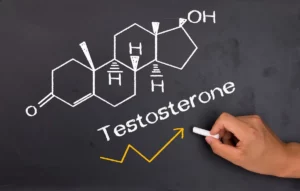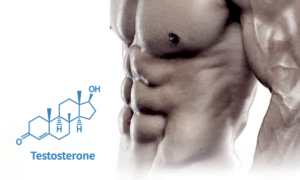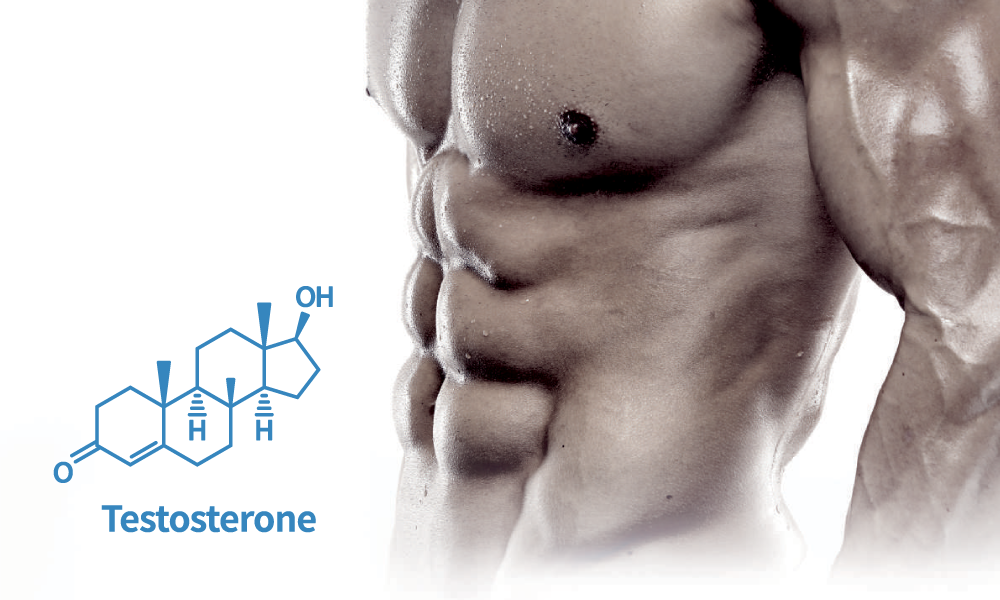Testosterone
According to the American Urological Association, about 2 in 100 men have low testosterone, and this condition becomes more common with age, affecting approximately 20% of men over 60, 30% of men over 70, and 50% of men over 80.

What is Testosterone?
Testosterone is a vital hormone that plays a crucial role in men’s health, impacting physical, sexual, and mental well-being.
It is responsible for the development of male characteristics during puberty and maintaining various bodily functions throughout life.
Healthy testosterone levels are essential for muscle mass, bone density, libido, and overall vitality.
Maintaining these levels can significantly enhance quality of life, promote longevity, and reduce the risk of various health issues.
Benefits of Testosterone

Physical Health
Testosterone is fundamental for maintaining and enhancing muscle mass and strength.
It promotes protein synthesis, which is crucial for muscle growth and repair.
Additionally, testosterone helps maintain bone density, reducing the risk of fractures and osteoporosis.
Men with healthy testosterone levels often experience better physical performance, higher energy levels, and improved overall fitness.

Sexual Health
Testosterone is essential for sexual health, influencing libido, erectile function, and fertility.
It drives sexual desire and arousal, playing a critical role in maintaining a healthy sex life.
Adequate testosterone levels ensure proper sperm production and reproductive health.
Men with balanced testosterone levels typically experience fewer issues with erectile dysfunction and have higher fertility rates.

Mental Health
Testosterone significantly impacts mental health, contributing to mood regulation, energy levels, and cognitive function.
It helps maintain a positive mood and prevents feelings of depression and anxiety.
Testosterone also supports cognitive functions such as memory, concentration, and problem-solving skills.
Men with healthy testosterone levels often report higher motivation, better focus, and overall mental clarity.
Signs of Low Testosterone

Physical Symptoms
-
Fatigue:
Persistent tiredness and lack of energy, even after adequate rest, can indicate low testosterone levels, impacting daily activities and overall vitality.
-
Reduced Muscle Mass:
Despite regular exercise, men with low testosterone may experience a decrease in muscle size and strength, making it harder to maintain physical fitness.
-
Increased Body Fat:
Low testosterone can lead to increased fat accumulation, particularly around the abdomen, making weight loss more challenging and potentially contributing to obesity-related health issues.
Sexual Symptoms

-
Decreased Libido:
A noticeable reduction in sexual desire and interest in sexual activities, which can affect intimate relationships and overall quality of life.
-
Erectile Dysfunction:
Difficulty achieving or maintaining an erection sufficient for sexual activity, which can be frustrating and impact self-esteem.
-
Infertility:
Lower testosterone levels can result in a decreased sperm count and poor sperm quality, leading to challenges in conceiving children.
Mental Symptoms
-
Mood Swings:
Frequent and unpredictable changes in mood, irritability, and heightened emotional sensitivity can be signs of hormonal imbalance.
-
Depression:
Persistent feelings of sadness, hopelessness, and a lack of motivation or interest in activities once enjoyed, often linked to low testosterone.
-
Difficulty Concentrating:
Trouble focusing, memory issues, and a decrease in cognitive function can impact work performance and daily tasks, reducing overall productivity and mental clarity.
Recognizing these symptoms can prompt individuals to seek medical advice and testing, leading to appropriate treatment and improved overall health.
Natural Ways to Boost Testosterone Levels

Diet
A nutritious diet can significantly impact testosterone levels by providing essential vitamins and minerals.
-
Foods Rich in Zinc:
Zinc is crucial for testosterone production. Include foods such as oysters, lean meats, poultry, beans, nuts, and seeds.
-
Vitamin D:
Vitamin D supports testosterone levels and overall health. Sunlight exposure and foods like fatty fish, fortified dairy products, and egg yolks are excellent sources.
-
Healthy Fats:
Incorporate healthy fats found in avocados, olive oil, nuts, and fatty fish to support hormone production and balance.

Exercise
Regular physical activity, particularly certain types of exercise, can boost testosterone levels.
-
Strength Training:
Lifting weights and resistance training can increase testosterone production.
Focus on compound movements like squats, deadlifts, and bench presses.
-
High-Intensity Interval Training (HIIT):
Short bursts of intense activity followed by rest periods can elevate testosterone levels. Examples include sprinting, cycling, or circuit training.

Lifestyle Changes
Adopting a healthy lifestyle can naturally enhance testosterone levels.
-
Adequate Sleep:
Aim for 7-9 hours of quality sleep each night to optimize hormone production. Poor sleep can lead to decreased testosterone levels.
-
Stress Management:
Chronic stress elevates cortisol, which negatively affects testosterone. Practice stress-reducing techniques such as meditation, deep breathing exercises, or yoga.
-
Avoid Excessive Alcohol and Smoking:
Limit alcohol consumption and avoid smoking, as both can lower testosterone levels.
Moderate lifestyle habits contribute to maintaining balanced hormone levels.
—————————-
At Enthusiast Express, we emphasize the importance of a holistic approach to health, incorporating a balanced diet, regular exercise, and positive lifestyle changes.
By prioritizing these elements, men can support their testosterone levels naturally, ensuring vitality and longevity.
Remember, for personalized advice and treatment options, consulting with healthcare professionals is always recommended.

